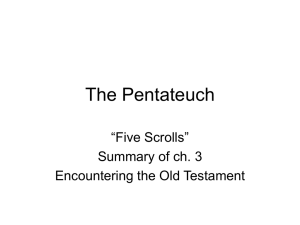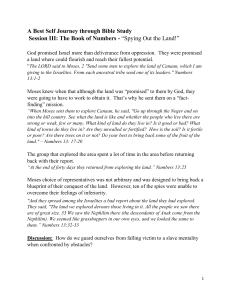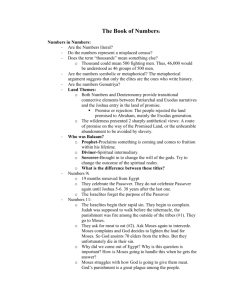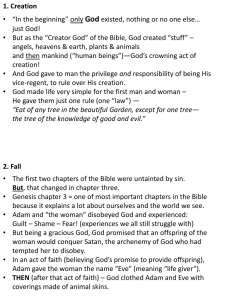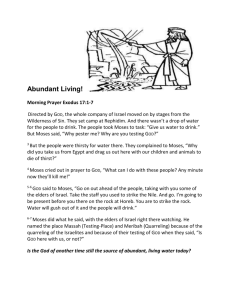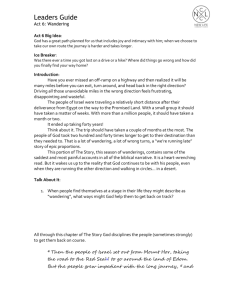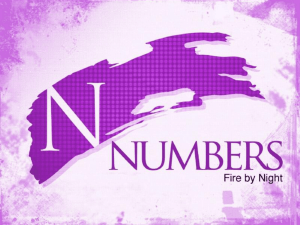Numbers 26/30 A new beginning
advertisement
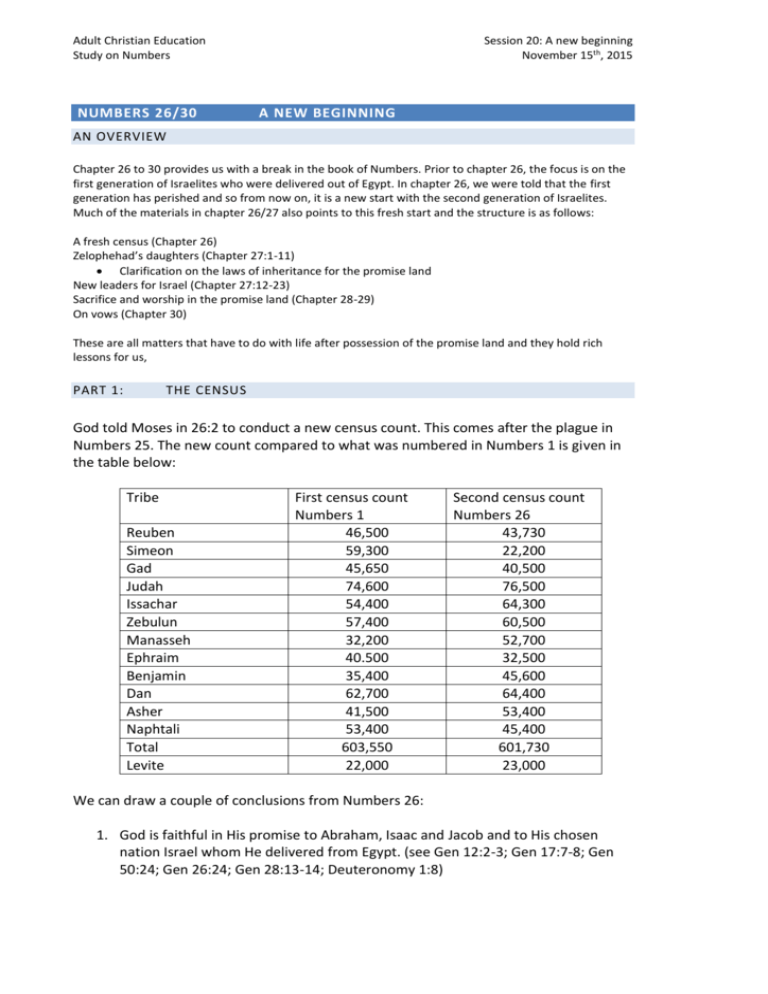
Adult Christian Education Study on Numbers NUMBERS 26/30 Session 20: A new beginning November 15th, 2015 A NEW BEGINNING AN OVERVIEW Chapter 26 to 30 provides us with a break in the book of Numbers. Prior to chapter 26, the focus is on the first generation of Israelites who were delivered out of Egypt. In chapter 26, we were told that the first generation has perished and so from now on, it is a new start with the second generation of Israelites. Much of the materials in chapter 26/27 also points to this fresh start and the structure is as follows: A fresh census (Chapter 26) Zelophehad’s daughters (Chapter 27:1-11) Clarification on the laws of inheritance for the promise land New leaders for Israel (Chapter 27:12-23) Sacrifice and worship in the promise land (Chapter 28-29) On vows (Chapter 30) These are all matters that have to do with life after possession of the promise land and they hold rich lessons for us, PART 1: THE CENSUS God told Moses in 26:2 to conduct a new census count. This comes after the plague in Numbers 25. The new count compared to what was numbered in Numbers 1 is given in the table below: Tribe Reuben Simeon Gad Judah Issachar Zebulun Manasseh Ephraim Benjamin Dan Asher Naphtali Total Levite First census count Numbers 1 46,500 59,300 45,650 74,600 54,400 57,400 32,200 40.500 35,400 62,700 41,500 53,400 603,550 22,000 Second census count Numbers 26 43,730 22,200 40,500 76,500 64,300 60,500 52,700 32,500 45,600 64,400 53,400 45,400 601,730 23,000 We can draw a couple of conclusions from Numbers 26: 1. God is faithful in His promise to Abraham, Isaac and Jacob and to His chosen nation Israel whom He delivered from Egypt. (see Gen 12:2-3; Gen 17:7-8; Gen 50:24; Gen 26:24; Gen 28:13-14; Deuteronomy 1:8) Adult Christian Education Study on Numbers Session 20: A new beginning November 15th, 2015 Consider: a. The nature of those who constitutes Israel. b. The condition of the environment for which they were in. c. The duration of the trial. d. The strength of their opposition and their determination to wipe out Israel. e. What should be my response? 2. God is faithful in His judgement (see Numbers 14:20-24; Numbers 26:64) a. What should be my response? 3. God is merciful in His judgement (see Numbers 26:9-11; 26: 58) a. What should be my response? We note also the purpose of this census: 1. It is to count man who are going to fight for Israel. This purpose remain the same as the previous census in Numbers 1. 2. A different reason for the count is that this census will be the basis for the distribution of the Land. We further note that: a. The land is a gift (inheritance) from the Lord. b. The size of the tribe would be taken into consideration in apportioning the land. The bigger the number, more land will be given. No special favor is given to any tribes. c. The actual allocation will be done according to the casting of the sacred lot (v55). This implies that Yahweh will be the one who will determine the actual placement of the inheritance. d. The arrangement will be by tribes (retaining their familial or tribal identity) e. The Levites will not be given land as inheritance as God is their portion. Their numbers and clans are given for full record. Adult Christian Education Study on Numbers PART 2: Session 20: A new beginning November 15th, 2015 NEW LEADERS FOR ISRAEL (Note: we will skip and postpone Numbers 27:1-11 till we come to Numbers 36 and do them together) With the new generation, there is a need for a new leader. Moses will not be able to bring the Israelites into the promise land because of his trespass at Meribah. His death is imminent though it will not be described until Deuteronomy 34. We want to note a few things: 1. See the heart of Moses as he pleads with God for the new leader for Israel. This is the only other time in which Moses use the title “God of the spirit of all flesh” in his prayer to God. Using this title, Moses acknowledge the sovereignty of God over His creation. Incidentally, the other time this title was used was when Moses plead with God in the uprising of Korah. In both events, Israel faced the crisis of leadership and Moses appeal to God’s reign to be gracious and to predispose his good will towards his people. The character of such a person is given in the prayer of Moses: a. Verse 17 gives us one requirement that this leader is able to “go out before them and go in before them, who may lead them out and bring them in”. While this may bring out many qualities, one of the main idea is the ability to lead the Israelites in the numerous conquests (wars) that will follow their entry into Canaan (see c.f. to Deuteronomy 31:2-3; Joshua 14:11). b. To do thing “before them (i.e. in the view of the congregation) represents a true leader whose life (words and actions) are ever before the people. c. Finally, he is to be a shepherd for Israel. To be a shepherd means several things: i. ii. iii. iv. A shepherd is the protector/guardian of the sheep. A shepherd plans and provides for his sheep. A shepherd is truly concern about the wellbeing of his sheep. A shepherd leads the sheep. d. What can we learn from the prayer of Moses concerning new leadership? Adult Christian Education Study on Numbers Session 20: A new beginning November 15th, 2015 2. We see the acknowledgement of God to Moses’ pleading by appointing Joshua to be the new leader. We want to observe a few things that was mentioned about Joshua: a. Verse 18 tells us that Joshua is a “man in whom is the Spirit”. The word Spirit here is linked with verse 16 which identifies God as the “God of the spirits of all flesh”. So Joshua is a man who has the Spirit of God indwelling in him. b. Secondly we note that this indwelling of the Holy Spirit is neither temporary nor a new thing that just came upon Joshua (contrast this to the elders in Numbers 11:17, 25-26). Rather, he has been endowed with the Spirit and Joshua’s exploits was the outworking of the Spirit. This was the basis for God’s choice of him. In Deuteronomy 34:9, the phrase “full of the spirit of wisdom” was applied to Joshua, confirming the thoughts here in Numbers 27:18. What can we learn from the appointment of Joshua? 3. The investiture of Joshua as the new leader for Israel’s new generation. We can observe a few things: a. Moses is to take the initiative (see Verse 18, “take Joshua, the son of Nun with you …”) b. There is a public laying on of hand from Moses, signifying an open and solemn demonstration of the transfer of power (leadership) from Moses to Joshua. How do we know its public? Verse 19 tells us that this ceremony is to be done in the sight of all congregation of Israel as well as Eleazar the high priest. In the same way, the congregation is commanded to be obedient to the new leader Joshua and no one can pretend that he is not aware of the change. c. The investiture will include a command (verse 19: inaugurate in NKJV) which is the passing on of the commission of God from Moses to Joshua. (We can understand it as the mission statement for the group). To see the actual command, see Deuteronomy 31:7-8. d. The transfer of power and authority will be gradual with Moses still able to provide a smooth transition from now till his death. In verse 20, Moses is commanded to immediately pass some of his authority to Joshua so that the congregation may learn to follow the new leader. Adult Christian Education Study on Numbers Session 20: A new beginning November 15th, 2015 e. While Moses (a type of Christ in whom all three offices of prophet, priest [shared with Aaron] and king reside in that one person) can intercede directly with God (also taking his Levite background), Joshua would not be allowed to do that. In matters of intercession with God, he will depend upon Eleazar the high priest for consultation and for critical decision, it will be based on Urim (by the casting of lot) before the Lord. f. What are the things we can learn from these observations? PART 3: RELIGIOUS LIFE IN THE PROMISED LAND We are back to our familiar topic of the offerings (or sacrifices). First of all we want to note that while these 2 chapters are very exhaustive on all the offerings that is commanded of Israel, it nevertheless only deals with offerings that are wholly (exclusively) to Yahweh. This should provide significant insight into the purpose of this passage. Can you make a suggestion as to what that is within your group? Can you recall what is sacrifice (or offering)? May be some of the questions can be: Why do we need to have sacrifices? o Consider that the sacrifice that is mentioned here focus on “complete burnt offering”, does that help in your answer? o In verse 2, we have the phrase “My food for my offering”. Think of the Lord’s Supper. What’s other purpose for the offerings? o Having answered the 2 questions above, ask yourselves, why does the offering require the death of the animals? If God is our creator and owns all His creation, why is there a need for sacrifice? Adult Christian Education Study on Numbers Session 20: A new beginning November 15th, 2015 In the expositor’s commentary to Numbers, the author put forward the translation of this section in the following way: Then Yahweh spoke to Moses saying: “Command the Israelites, and say to them, ‘You must be careful to present to me my offering, My food of my offerings by fire, my soothing aroma, at the appointed time for each.’ “And you will say to them, ‘This is the offering by fire that you shall present to Yahweh.’ ”1 It is immediately clear from this arrangement that these are not the institution of Moses. Rather they are the commandments from God. It is not the Laws of Moses, rather it is the Laws of God. Thus, we need to ask ourselves, if these are the Laws, then in what way they should be manifested in our life in the present age. We want to observe that there is a regularity, a kind of rhythm in these arrangements. For the redeemed community, there will be the daily sacrifices (morning and evening), the weekly Sabbath gathering and then the sacrifice on the first of each month. When you look at the pattern of overlapped and intertwining offerings, suggest to one another what that could mean for the Israelites, and for us as modern day Christian: Note down the intention of the following verses: 1 Sam 15:22 Isaiah 1:1-18 Psalm 40:6-8/Micah 6:6-8 How would you reconcile it with the commandment here from Yahweh concerning the sacrifices? 1 Allen, R. B. (1990). Numbers. In F. E. Gaebelein (Ed.), The Expositor’s Bible Commentary: Genesis, Exodus, Leviticus, Numbers (Vol. 2, p. 948). Grand Rapids, MI: Zondervan Publishing House. Adult Christian Education Study on Numbers Session 20: A new beginning November 15th, 2015 We can mark out several characteristics in the sacrificial practices: APPOINTED TIME Verse 2: “Command the children of Israel, and say to them, ‘My offering, My food for My offerings made by fire as a sweet aroma to Me, you shall be careful to offer to Me at their appointed time.’ What do you think should be the application for us today? ACCEPTABLE GIFTS Look at verses 3-5, 7; 9; 11-14; 18-21 etc… What can you say about these descriptions? PLEASING AROMA In the light of those Numbers 28/29 and those verses you have gone through (1 Sam 15:22, Isaiah 1:1-18; Psalm 40:6-8; Micah 6:6-8), now compare it to NT passages like Rom 12:1-2; Hebrews 10:5-7, discuss among your group what is the “pleasing aroma” to the Lord. THE COST OF THE SACRIFICES The structure of the offerings given in Chapter 28/29 can be summarized in the table below. Do a bit of tabulation and fill in the table2: 2 Table courtesy of NICOT on Numbers by Ashley (chapter 28) Adult Christian Education Study on Numbers Session 20: A new beginning November 15th, 2015 Whole burnt offerings Bull Rams Lambs Purification Male goat Daily (28:3-8) Sabbath (28:9-10) New Moon (28:11-15) Unleavened bread (28:16-25) First fruits (28:26-31) Trumpets (29:1-6) Day of Atonement (29:7-11) Tabernacles (29:12-34) Day 1 Day 2 Day 3 Day 4 Day 5 Day 6 Day 7 Tabernacles + 1 (29:35-38) THE FEASTS Can you provide the background and the reason for each of the feasts? PASSOVER (28:16-25) (References: Exodus 12:14-20; Leviticus 23:4-8; Deuteronomy 16:1-8) Look at 1 Corinthians 5:7; Hebrews 11:28, can you draw the connection between the OT feasts of the Passover with Jesus Christ? FEAST OF THE WEEKS ( 28:26-31) (References: Exodus 23:16; 34:22; Leviticus 23:15-22; Deuteronomy 16:9-12) Look up Acts 2:1-4; what connection can you draw for the feast of the weeks with NT believers? Adult Christian Education Study on Numbers Session 20: A new beginning November 15th, 2015 FEAST OF TABERNACLES (29) This consists of a series of feasts in the 7th month. The main focus would be the actual Tabernacle observance starting from the 15th day to the 24th day. A. Feast of the trumpets (v1-6) Heralding the entrance of the king? B. Day of atonement (v7-11) It is a day of confession, contrition, and celebration (Leviticus 16; 23:26-32) It usually is observed as a day of fasting (Psalm 35:13; Isaiah 58:3,5) Question: If the feast of Tabernacles is meant to herald the enthroning of the king, why is there a need for it to begin with the day of atonement? C. Feast of the Tabernacles (or Booth or Ingathering) Look at Deuteronomy 16:13-15 and Ezekiel 45:25, can you deduce the purposes of this feast? What relevance or application does it hold for us today? D. Congregational worship on the day after the conclusion of the Feast of the Tabernacles. Finally in verses 29:39-40, there is a reminder that this is the public worship and these offerings are made as congregational offerings. Any private offerings on the part of the individual would have to be made over and above what has been stated. There is also a concluding remark from Moses that this is the instructions from God and he has thus accurately conveyed all to Israel. SUMMARY
